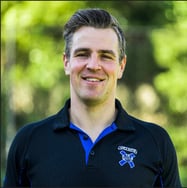Search the latest and greatest job opportunities in sport

Are you considering a Master's degree in Sports Business, but not sure if it’s the right career choice for you? We spoke to 3 recently graduated Master's students from three of the top Sports Business Universities in the world. Here, Kieran Donohue (Deakin University) Antoine Gueguen (Emlyon Business School), and Yacine Abeka (AMOS Sport Business School) share their experiences and perspective on why they chose to undertake a Master's in Sports Business, what they are doing now and their advice to those considering the big decision and commitment.

Kieran: During COVID, I was conscious of the number of sports administrators who had decided to go back to university while there was so much uncertainty in the sports industry and I didn’t want to “fall behind” being an administrator without a Masters degree. I had been interested in completing an MBA since graduating from my Bachelor of Business degree, but never really found the course that suited my needs. When I become aware of Deakin’s online-based Executive Masters of Sport Business, (EMSB) this looked like the perfect mix of sport, business and management that I was looking for.
Antoine: Sport industry employees are most of the time former athletes or big sports fans or educated smart visionary start-up founders. Having a Masters is a must have, it has become an industry standard and clearly a valuable asset in the competitive hiring process. Also, I was studying law and political sciences as an undergraduate and I needed that step into business with a clear emphasis on the Sports Industry. The MSC in Sports Industry Management at Emlyon was therefore the perfect choice.
Yacine: A Global Sport Business Masters at AMOS was the logical next step for me after completing 2 Bachelors at AMOS Paris and the University of Tennessee. The jobs market is fiercely competitive with many candidates holding Bachelor degrees. A Masters therefore allows you to step up and differentiate yourself from the competition. The international option that I chose was also appealing and a few years on, I am not regretting my choice.
Kieran: The nature of the 'intensive' units in particular provided the flexibility to study a topic in-depth in a shortened period of time. This structure really took into account existing knowledge and experience. The self-paced nature of many of the 'intensives' meant I could complete classes at a time that suited me. Each unit was delivered in a completely unique fashion, including multi-modal styles such as podcasts, guest speakers, simulated negotiations etc. which really kept things interesting.
Antoine: The two company projects with Nike France and Decathlon were both very inspiring and allowed me to craft the first steps of my early career. The opportunity to take a leadership role even within the cohort also stands out. Building a network is one of the most valuable aspects of studying a Masters, but representing fellow students as a delegate was something even more special. Last but not least, I have made friends for life!
"The opportunity to take a leadership role even within the cohort also stands out."
Yacine: The internationalisation and the network the course provided access to were the key things that helped me to succeed in my early career following my Masters.
Kieran: Deakin’s reputation in the sports industry and connection to a number of key sporting organisations was very attractive. Also, the flexibility of the Cloud Campus at Deakinwas necessary for me, as I was working full-time.
"Deakin’s reputation in the sports industry and connection to a number of key sporting organisations was very attractive."
Antoine: The reliability of Emlyon on the international stage. The school is well known by top companies’ HR departments, has a good reputation and a supporting alumni network; plus, the school’s career service is always ready to support.
Yacine: At the time, AMOS was fairly new, so it was quite easy to speak with the school's Director to offer new ideas. I liked how they were really open and listened to new propositions.
Kieran: A focus on the strategic elements of the business of sport, which I have garnered through the EMSB, has certainly helped me to take the next step in my career. I am currently a Sportsmaster at Knox Grammar School, an Independent School in Sydney’s North. Since commencing the Executive Masters in Sports Business, I have received a promotion so that I now oversee all sport that is offered to the 2,000+ students at the School.
Antoine: I am working for Nike as a Sales Manager for France, Southern-Europe, Middle East and Africa. My education supported me to standardise my applications and communication to top companies, which also helped me get selected for a one-year internship in 2017.
Yacine: I am currently working for Genius Sports as a Football Partnerships Manager. My education helped me to secure my first position at UEFA, thanks to the quality internships I had the opportunity to undertake.
"My education helped me to secure my first position at UEFA."
Kieran: Students should consider the structure of the course. The self-paced style of this course is well suited to busy sports industry professionals. Doing two electives per trimester, and taking advantage of electives during quieter times of the season really helps. More than anything, you need to ensure that you are super organised. The Sport industry is notorious for being face-paced and for its long hours, so if you aren’t organised, you can quickly become overwhelmed. Communication with Unit Chairs has been vital to ensure the course commitments can integrate into a busy work schedule.
Antoine: Even former pro-athletes follow the courses and go after a Masters nowadays, while already having a tremendous network; this means that succeeding alone in the sports industry is not easy today. More than a network you need skills and reliability. Start approaching your favourite companies early enough to stand out versus your fellow students who will apply for internships at the same time as you. Aim high and don’t compromise. You’ll never miss the shots you don’t take.
Yacine: A Master degree may not always be the answer, but if you are hesitating about your future or have mid to long term projects or aspirations that will require an upgrade on the education side, then a Masters degree has to be the next challenge and will be an amazing experience.

Search the latest and greatest job opportunities in sport
In the world of professional sports, sponsorship represents a significant source of revenue and plays a vital role for t...
Read moreThe sports industry is a vibrant and multifaceted industry, made up of a diverse range of sectors that shape its global ...
Read morePablo Romero, director of protocol at Sevilla FC and lecturer in the UCAM Master's Degree in Sports Management, shares t...
Read more